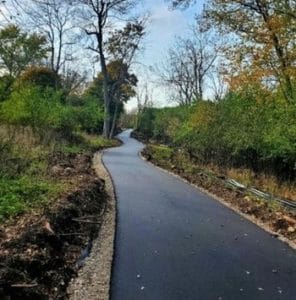The latest news to us covers a handful of regional and statewide projects, including efforts to improve snuffbox mussel populations, Washtenaw County Border-to-Border Trail developments, a new statewide drinking water reporting tool, and Huron River PFAS monitoring. Dive into the latest headlines capturing our attention below.

Huron River PFAS contamination levels drop after 2-year treatment
A recent announcement from the Michigan Department of Environment, Great Lakes, and Energy (EGLE) indicates recent levels of per- and polyfluoroalkyl substances (PFAS) in the Huron River are down 99.5% from 2018. Since 2018, EGLE has been monitoring the water and fish of Huron River for PFAS. These recent results are proof EGLE’s source tracking abd voluntary PFAS reduction efforts have been successful.
Showcasing the DNR: Growing nature’s clean-water engineers
Snuffbox mussels serve an important role in Michigan’s aquatic ecosystems by filtering water, making food available to organisms, and serving as a biological indicator of a healthy water system. However, mussel populations have been declining, meriting their protection via the Endangered Species Act. The Michigan Department of Natural Resources and statewide partners are launching a mussel propagation and monitoring program to aid the restoration of snuffbox mussels.
New segments open along non-motorized Border-to-Border trail
This fall, new upgrades along the Border-to-Border (B2B) Trail opened. These newly renovated segments are located at M-52 near Chelsea, Grove Road and North Hydro Park in Ypsilanti Township, and Frog Island Park in Ypsilanti. A few additional stretches, such as the Delhi Metropark to Zeeb Road connector in Dexter (pictured above), are still in progress but close to completion. To view a map of the B2B updates, click here.
Parks for all: How Michigan communities are making their outdoor spaces safe and accessible
Thanks to grants from the Michigan Natural Resources Trust Fund (MNRTF), Michigan’s natural resources are becoming increasingly accessible to folks of all abilities. MNRTF enables municipalities and parks agencies across the state to construct universally accessible paths, boardwalks, kayak launches, and restroom facilities.
Online platform launched to report drinking water concerns in Michigan
The Michigan Department of Environment, Great Lakes, and Energy (EGLE) recently launched an online tool for members of the public to report drinking water quality concerns. The tool, called the Drinking Water Concern System, provides an additional channel for Michigan residents to submit concerns to EGLE or their local health department. Click here to view the tool.



